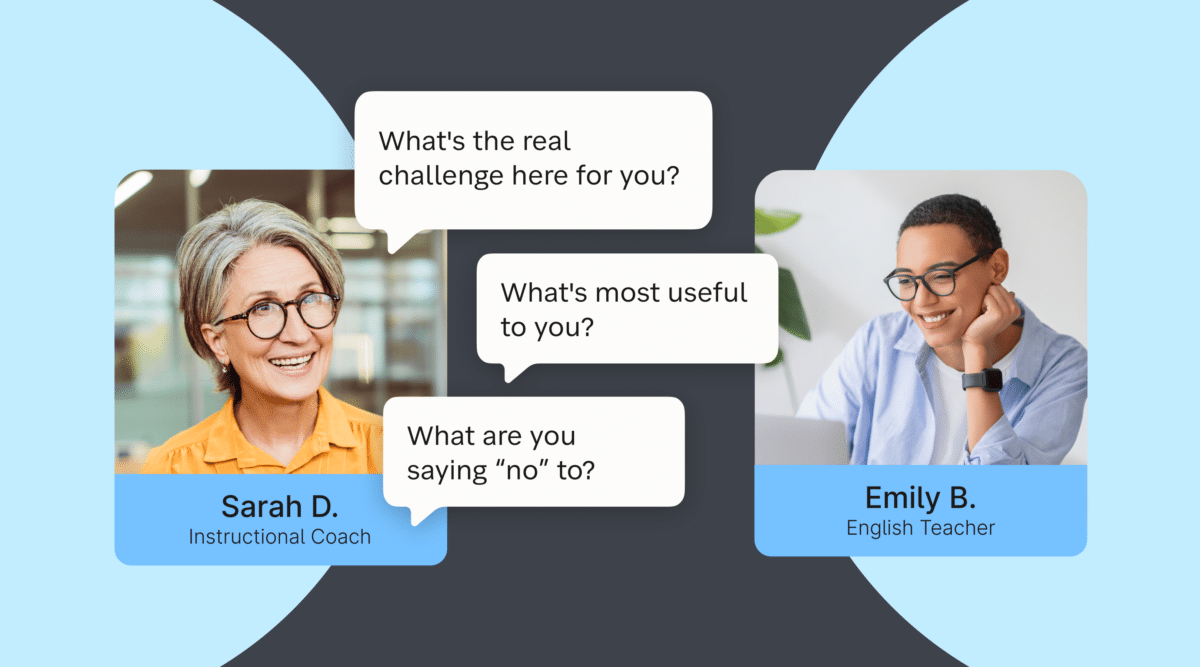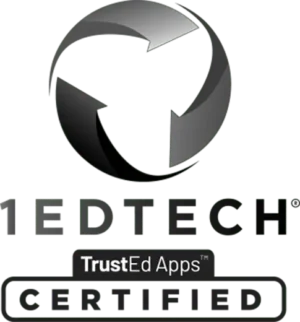
Instructional Coach, Dana Kramaroff, from Boyertown Area School District in Pennsylvania, shares a few of her frequently used open-ended questions during her coaching sessions to allow for the teacher to expand on their responses—leading to self-reflecting learning.
At the heart of my instructional coaching work, with teachers, is the idea that I have one mouth and TWO ears. My goal is to begin open-ended conversations that push teachers to think and reflect. Listening and allowing them to do the talking is key to growing trust. The go-to openers that I keep in my back pocket serve me well to do just that and prove their worth in helping me to meet teachers where they are in their learning process.
What are your students struggling with now?
Teachers are incredibly hard on themselves. If I were to ask, “What are you struggling with right now?” then the focus is on the teacher and their defenses might go up. If I shift the focus to what students are struggling with, then conversations open about that one student, small group, or even the whole class. This is where coaching begins—in a place where we are student-centered.
Can you talk more about that?
The kind of conversations that help teachers to elaborate on their experiences encourage the coach-teacher relationship to flourish. I have never had a teacher answer this question with an “N-O.” In fact, each time I ask this, they always dig deeper. When it seems that they have exhausted their thinking, I ask it one more time and I’m always pleasantly surprised at how quickly they get to the heart of things. The job of the coach is not to give all the answers but to guide teachers to find the answers on their own.
What has happened in the past that makes you think that will happen again?
When teachers assume something will not work, they often base that supposed failure on what has happened in the past. By framing the question in this way, teachers are given an opportunity to realize that their fears or hesitations may be unfounded. When my teachers answer this question, we are able to gain insight into where the teacher was and where they want to go. That space between the past and the future is the place where the work may begin.
How may I support you?
Some coaches might think to ask, “How can I help you?” but using the word help may denote that teachers are in need of helping or fixing, in a “Help, I’ve fallen and I can’t get up,” kind of way. Supporting is a caring act, a proverbial set of arms wrapped around you. Supporting can mean building one up, like the way steel beams support a skyscraper’s construction. Supporting can also mean being a shoulder to lean on, like the way one grabs onto a piece of furniture when they have stubbed their big toe. Supporting is a soft place to land. Always, I want to be a soft place to land for my teachers.
Final Note
Hearing my teachers with my two ears and allowing their voice to speak louder than my own voice cultivates long-lasting relationships built on trust. And when in doubt, there is always my ‘In case of emergency break glass’ question: What’s your favorite candy bar?
About Our Guest Blogger
Dana Kramaroff is in her ninth year as a K-5 Instructional Coach in the Boyertown Area School District. She became a proud fellow of the National Writing Project in 2004 and was recently named a co-director of her local chapter: the Pennsylvania Writing and Literature Project. In addition to loving her work with teachers and students, she is a mom of three, wife, writer and an active member of the Society of Children’s Book Writers and Illustrators. Dana is an avid Twitter user and would be very happy to connect with you!Follow Dana on Twitter @litdanak
Stay Connected
News, articles, and tips for meeting your district’s goals—delivered to your inbox.






















